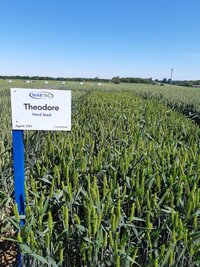Date: 10/2020
 DSV’s new group 4 hard wheat variety Theodore, which was added to the AHDB Recommended List for the first time last year, has again underlined its class-leading disease resistance in 2020 harvest results, says the company’s Sarah Hawthorne.
DSV’s new group 4 hard wheat variety Theodore, which was added to the AHDB Recommended List for the first time last year, has again underlined its class-leading disease resistance in 2020 harvest results, says the company’s Sarah Hawthorne. “Looking at the AHDB figures for this year’s harvest, Theodore is indisputably the UK’s cleanest wheat.
“Theodore achieved highest untreated yield of all Group 4 wheats at 118% of control representing 8.9t/ha, with an overall disease infection score of just 6.6% compared to the nearest group 4 variety in second spot (35%).
“Theodore achieved the highest untreated yield of all Group 4 wheats at 118% of control representing 8.9t/ha, with an overall disease infection score of just 6.6%. In comparison, the variety in second spot on the Group 4 list had an infection score of 35%.
“This performance was achieved without sacrificing quality with Theodore achieving a specific weight of 76.6 kg/hl and a protein content of 12.1%.”
The results follow similar experiences in 2019 where strikingly clean crops of Theodore were seen up and down the country, she explains.
“Theodore tops the current RL in terms of septoria resistance with a score of 8.2 and this has been more than borne out in two years of commercial growing in the field and in trials results.
“The variety also scores a 9 for yellow rust, a 7 for brown rust and a 6 for fusarium ear blight in the RL, all of which contribute to an exceptional overall disease resistance score.
“It’s a variety very much bred for today where in-built ability to cope with disease threats are increasingly important as are potential savings in agronomic inputs.”
The development of Theodore is a milestone for the industry and gives hope that genetics will be able to replace the sprayer to a larger degree in the future, Sarah Hawthorne says.
“More and more farmers are looking at the overall economics of a variety and its resilience in the face of adverse conditions rather than just its outright yield potential.
“Whilst Theodore’s untreated yield potential is impressive, in real terms it means growers will have greater flexibility in their fungicide use when weather and other commitments prevent perfect timings of applications.
“Managed correctly, its superb combination of disease resistance and agronomic properties also point the way to genuinely lower cost wheat production in the future.”